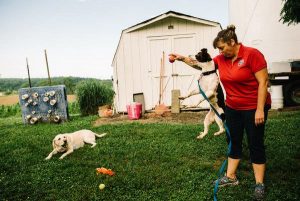Cybil Preston, State Apiary Inspector, MDA
Phone 410-841-5920, Fax 841-5835, Cell 410-562-3464

The Summer drought in most of Maryland was fairly short. The rain later in the summer helped push a really good goldenrod flow. Goldenrod could be seen all over– on roadsides, field edges, meadows! It was wonderful to see so much of it in bloom. The smell emanating from the colonies was wonderfully pungent.
I am seeing a considerably lower number of "Fall Crash" or "Fall Dwindle" colonies. I think it is mostly because the bees experienced a decent Fall nectar flow, and also beekeepers were more aware of and anticipated the monitoring and subsequent treatment of varroa mites and varroa/viral issues. If you are treating your colonies for varroa mites, please do a mite count prior to and after use of your varroa control to ensure efficacy of your varroa control. Also if you have a very strong colony still rearing large numbers of brood, a second mite treatment may be needed if the first treatment only brought the mite numbers down to threshold.
If you have strong colonies that are robbing weaker colonies, they can reinfest themselves with varroa from the weak colony. Another thing to check for after the varroa treatment is the brood pattern before and after. Some varroa treatments can cause brood death and you also want to be sure the queen is still effective after your varroa control has been removed. Check for eggs and young larvae to ensure that your colony is still queenright.
Other pests... NOT Murder Hornets! Calls and emails are still coming in to the MDA for sightings of what people think is the "Murder Hornet." We do not have the Asian Giant Hornet here in Maryland and we are continuing to monitor for it. European Hornets are still an issue for beekeepers, however. They have been in higher numbers this year and will pick the honey bees right out of the air or right off the colony. Their. impact is seemingly worse in apiaries that have had to do supplemental feeding. Make sure to reduce your entrances especially if you are feeding.
Field Watch/Bee Check: This Voluntary beehive mapping tool is going strong. There are more beekeepers registered than any other crop.
Thank you to all the beekeepers that participated in the USDA/APHIS National Honey Bee Survey. We got a really late start due to the Covid-19 shut down and new protocols... BUT we were still able to sample 13 sites a single time, and 5 sites received dual sampling. AGAIN Thank you to all who were willing to participate. Anyone willing to participate in 2021, please let me know. You must have 8 colonies to qualify. I appreciate your willingness to participate!
Mack & Tukka: We are currently just back into our training routine bringing the "Boys" out of vacation mode. We are working on scenting and stamina at the moment. Maryland's AFB dogs will be back into their inspection routine soon. We will work on commercial beekeepers moving to California first.
Happy Fall and keep on ZOOMING!
